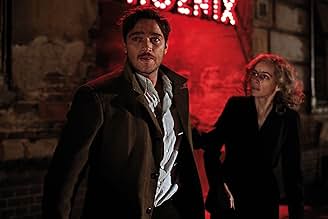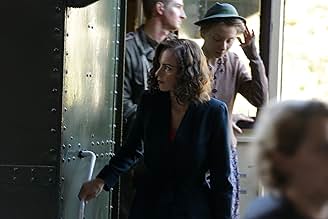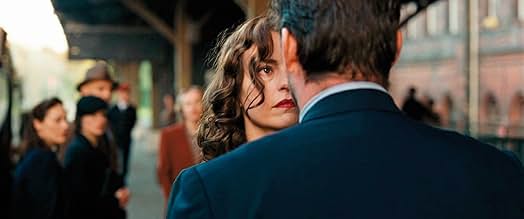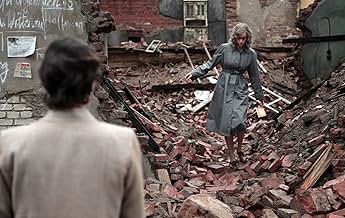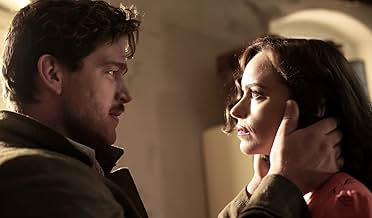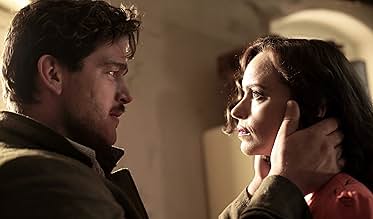अपनी भाषा में प्लॉट जोड़ेंAfter surviving Auschwitz, a former cabaret singer has her disfigured face reconstructed and returns to her war-ravaged hometown to seek out her gentile husband, who may or may not have betr... सभी पढ़ेंAfter surviving Auschwitz, a former cabaret singer has her disfigured face reconstructed and returns to her war-ravaged hometown to seek out her gentile husband, who may or may not have betrayed her to the Nazis.After surviving Auschwitz, a former cabaret singer has her disfigured face reconstructed and returns to her war-ravaged hometown to seek out her gentile husband, who may or may not have betrayed her to the Nazis.
- निर्देशक
- लेखक
- स्टार
- पुरस्कार
- 17 जीत और कुल 30 नामांकन
- Tänzerin
- (as Valerie Koch)
फ़ीचर्ड समीक्षाएं
Even if you're a disfigured Holocaust survivor like Nelly (Nina Hoss), tomorrow's march of time will bring its own survival scenario. Her new face gives her problems with her husband, Johnny (Ronald Zehrfeld), as he recruits her to impersonate his wife in order to get his wife's inheritance. As in Hitchcock's Vertigo, the lead female undergoes transformation dealing with the man in her life while sustaining the mistaken identity motif.
Even that plot feels Hitchcockean. No question it's a classic suspend-your-disbelief situation, and it has the almost dreamy quality of Boy in the Striped Pajama. Both works take an isolated, unbelievable scenario related to the Holocaust that nevertheless illuminates the numbing, existential anguish of that horror.
While Nelly searches for Johnny, she is also discovering strength in herself that is part survival and part recognition that the corruption of Auschwitz is not the only corruption in the world. The depiction of that dark postwar world has German expressionism written all over it with the black and white contrasts, lonely European streets and even the corruption and irony of the cabaret.
Nina Hoss's performance, part stunned and part determined, deserves award-season recognition. Her uncertain gait and disfigured face suggest the disorientation the war has brought.
Director Christian Petzold deserves credit for the stunning noirish look that also reflects a real-world, anytime struggle humans have with the combat between appearance and reality and the realization that we cannot know each other completely. As the title suggests and the name of the night club reflects, regeneration is possible but may be as elusive as the mythical bird.
"No movie has ever been able to provide a catharsis for the Holocaust, and I suspect none will ever be able to provide one for 9/11. Such subjects overwhelm art." Roger Ebert
Nina Hoss, Ronald Zehrfeld, and Nina Kunzendorf star in "Phoenix," a 2014 film based on the French novel "Return from the Ashes".
There was a previous film made from this novel, actually called Return from the Ashes in 1965. I remembered seeing that movie as a kid and finally found it again. It's very good, but this film is better.
Nina Hoss plays Nelly, a concentration camp survivor who was shot in the face. A government worker, Lena (Kunzendorf) in charge of helping victims, brings her to a plastic surgeon.
Nelly is adamant that she wants to look exactly as she did before. The doctor can only promise to try. When she asks Lena who is paying for all this, Lena tells her that her entire family is dead and she has come into quite a bit of money.
When Nelly sees herself, the face is foreign to her and she says, "I don't exist." She stays in an apartment with Lena. Lena has found an apartment for her in Palestine, where Lena is also moving.
Nelly wants to find her husband Johnny (Zehrfeld), a non-Jew, but Lena cautions her that he betrayed her to the Nazis. She was a singer and he a pianist, so she goes to various clubs, but finally finds him working in a club called Phoenix as a dishwasher.
Johnny doesn't recognize her, but he asks her if she wants some work. He explains to her that he can't get his hands on his wife's money. He wants her to impersonate Nelly, show up alive, claim her inheritance, and in return, he will pay her.
At first, Nelly refuses, then relents. He shows her a photo of Hedy Lamar and says his wife modeled herself on that.
Nelly returns to Lena and tells her that she's going to do the impersonation and not go to Palestine. She will stay with Johnny. She knows he would never have betrayed her.
Director Christian Pezold has woven noirish tapestry about survival, love, betrayal, and guilt. It is reminiscent of Vertigo but with the specter of the Holocaust, much deeper and intense.
Nina Hoss is beyond perfection as Nelly, desperate for her old life, her old face, her husband, to wipe out all she has suffered. Like Zehrfeld, she says more with her expressions than with dialogue. Zehrfeld as Johnny presents a disturbing puzzle of denial and horrific guilt, so unbearable that he tries to recreate Nelly.
The last scene in this film, in its simplicity, is stunning and powerful.
A brilliant film, which you may want to view more than once to pick up details along the way.
Couple of comments: this is the latest movie from German director Christian Petzhold, who previously has brought masterpieces like Barbara, Yerichow, Yella (all of which also star Noina Hoss), The State I Am In, and Gespenster. Petzhold is in my opinion one of Europe's most important and best directors, period. "Phoenix" touches many aspects: there is the immediate aftermath of WWII, and the enormous scars (physical, mental, and other) incurred by the Jewish people who managed to somehow survive; then there is the psychological mind games played by both Johnny and Nelly (did Johnny betray Nelly during the war? is Nelly betraying Johnny now?). It all plays out brilliantly. Check out the movie's final scene (no worries, I won't spoil), which stunned me and everyone else in the theater. Nina Hoss, in her 4th collaboration with Petzhold, brings another daring and touching performance as the shattered and brittle Nelly. Wow, just wow.
Even though this movie is a year old, it just now found its way to my local art-house theater here in Cincinnati. Better later than never, I suppose. I couldn't wait to see "Phoenix". The matinée screening where I saw this at this weekend was PACKED, somewhat to my surprise and delight. If you like a top-notch quality foreign movie that will stay with you long after you've seen it, you cannot go wrong with this, be it at the theater, on Amazon Instant Video, or eventually on DVD/Blu-ray. "Phoenix" is HIGHLY RECOMMENDED!
If this brings to mind the idea of Nicolas Cage and John Travolta swapping faces in the awesomely bad "Face/Off", then you're not far off the mark. But listen up, here's why it works perfectly.
The theme of "Phoenix" involves how people face an unacceptable past. There are 3 main characters who each personify a particular, extreme response. It has to be extreme, it has to be preposterous, and most importantly we have to accept it. Either that or just walk out of the theater after 5 minutes and watch Monday night football instead. Our 3 characers are: 1) Nelly - she cannot let go of her traumatic past, and at the same time she has no past because she has no identity, figuratively and literally. 2) The husband "Johnny" - he utterly rejects the past, for reasons you'll figure out soon enough, and so he refuses to recognize his wife. In fact, we get the feeling that even if she were the spitting image of herself, he would still refuse truth. Such is the nature of psychological denial. And 3) We have Nelly's only friend "Lena" who has become a tireless political activist, saving survivors and trying to keep the past "alive" even though she is confronted with a society that has already moved on.
So you see how this story isn't supposed to be taken as a literal drama but rather as a very creative metaphor to illustrate how psychology works in 3 vastly different personality types. Further driving the surreal nature home, we have gorgeously shot, vividly composed visuals. If you ever wondered how Film Noir would look in color, then look no further. There have been a few contemporary classics which sought to bring Film Noir into the modern age, such as 2005's "Sin City" with its introduction of red to the crisp b&w palette, or before that was 1994's "The Crow" with its use of extreme darkness and "dead" colors. Here in 2014's is the next decade's evolution. In this case there is bold use of colors, but they are distinctly and "impossibly" presented: a dark alley is illuminated with a ghostly red light even though there are no red light sources to be seen, or a dark scene of bombed out ruins has unrealistic islands of light illuminating patches of rubble, all in vivid color but with stark contrast against the black spaces. The cinematography and lighting is as purposely unrealistic as the plot.
Ultimately if you grasp all of this, or if you just decide to go along with it for the sake of seeing how everything turns out, your suspension of disbelief will be amply rewarded. As nearly every other reviewer has noted, the ending is fantastic. Beyond fantastic, it's the whole point of the movie. In an interview, director Christian Petzold says the entire story comes down to the last 3 minutes, and that's where it will either come together or utterly fall apart. For my money, it's a total winner. "Phoenix" definitely does NOT crash & burn.
Phoenix is a simple film with complicated themes of identity, survival, and loss. It is not your normal post WWII film, nor is it your typical concentration camp survivor story. The main character, Nelly, was in a camp and her trauma is reflected in the desperation of a divided Berlin. Her interactions with others are clearly influenced by her time in the camps, and Nina Hoss wonderfully portrays the protagonist.
Unfortunately, the actor who plays the lead male, Johnny (Ronald Zehrfeld) is relatively ineffective compared to the stunning Hoss. I am not sure whether is is the script or the acting, but he clearly isn't up to her level. Nelly's best friend, Lena, is performed with skill by Nina Kunzendorf. While not as remarkable as Hoss, she holds her own in their scenes together.
The look of the film is lovely, but it is clearly made on a budget. The music is appropriate for the mood and the era, though a couple of times too loud and overly dramatic. The pace is deliberate and effective.
It is a good film that offers us no answers to the questions it poses: how do we survive after everything is taken away, how do we return to a life that no longer exists, whom do we trust now when many of our old friends were Nazi or collaborators during the war, how do we react to someone who returns who we thought was dead, and where do we go when nothing is left of our former life. In the film, like life, there are no easy answers. That only strengthens the film's appeal.
Rating: Pay full price.
I don't want to say to much for fear of giving too much away. The film, while not shocking, is not predicable.
Peace, Tex Shelters
क्या आपको पता है
- ट्रिवियाThe woman on the magazine cover that Nelly liked to emulate was Hedy Lamarr.
- गूफ़The actor playing the US Army Sergeant sentry at the checkpoint is clearly German: while he speaks English well, his German accent still comes through.
- भाव
[first lines]
Lene Winter: [arriving at the border]
Soldat an der Brücke: Passport... Nice car. Where did you get it from?
Lene Winter: It's from Switzerland.
Soldat an der Brücke: Just like you?
Lene Winter: Like me.
Soldat an der Brücke: [whistles to the gate] They're from Switzerland. The girl too.
[to her passenger]
Soldat an der Brücke: I want to see your face.
Lene Winter: Can I talk to you?
[gets out]
Lene Winter: Come on, she's not Eva Braun.
Soldat an der Brücke: Of course not. The bitch got killed by her husband.
Lene Winter: She's from the camps.
- कनेक्शनFeatured in Love/Work/Cinema: A Conversation with Christian Petzold and Nina Hoss (2016)
- साउंडट्रैकSpeak Low
Music by Kurt Weill
Lyrics by Ogden Nash
Performed by Nina Hoss and heard as a theme over the credits
टॉप पसंद
- How long is Phoenix?Alexa द्वारा संचालित
विवरण
- रिलीज़ की तारीख़
- कंट्री ऑफ़ ओरिजिन
- आधिकारिक साइटें
- भाषाएं
- इस रूप में भी जाना जाता है
- Фенікс
- फ़िल्माने की जगहें
- Legnica, Dolnoslaskie, पोलैंड(Berlin in 1945)
- उत्पादन कंपनियां
- IMDbPro पर और कंपनी क्रेडिट देखें
बॉक्स ऑफ़िस
- US और कनाडा में सकल
- $31,84,472
- US और कनाडा में पहले सप्ताह में कुल कमाई
- $30,296
- 26 जुल॰ 2015
- दुनिया भर में सकल
- $58,55,623
- चलने की अवधि1 घंटा 38 मिनट
- रंग
- ध्वनि मिश्रण
- पक्ष अनुपात
- 2.39 : 1
इस पेज में योगदान दें



